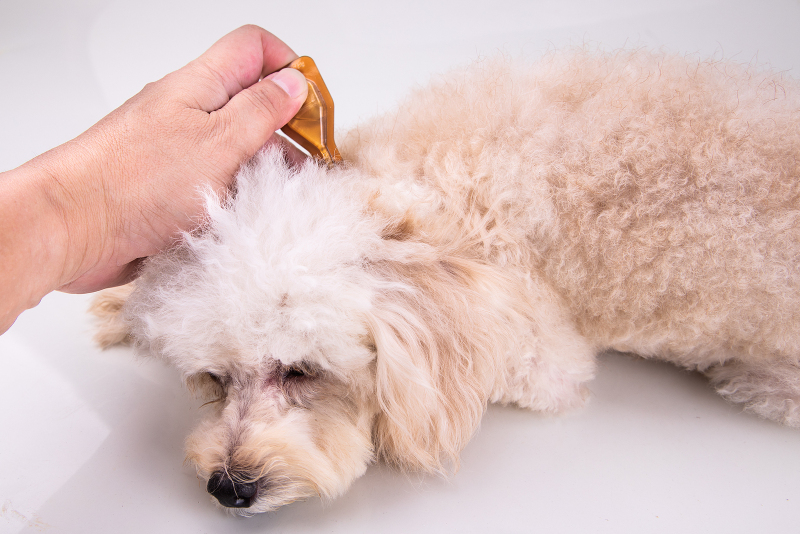Castor oil has a lot of benefits for humans like helping with digestion, encouraging hair growth, and relieving itchy skin. But, just because castor oil is useful for humans doesn’t mean that it’s good for dogs.
People who own dogs suffering from skin issues will likely wonder if castor oil could provide some relief. The short answer is “yes”. Castor oil is helpful for a dog’s itchy skin, and it is safe as long as it’s not ingested.
To learn more about using castor oil on your dog, keep reading. I cover what castor oil is, whether dogs can consume it for constipation, the benefits of castor oil on dog skin and exactly how to use castor oil to help your dog.
What Is Castor Oil?
Castor oil is a common type of vegetable oil that people use to treat many health problems. It can help with hair growth, skin itchiness and irritation, and digestive problems. It is commonly found in medications, and many people use it to cook as well.
The oil is derived from the seeds of the castor bean plant. The plants love to grow in the warm, tropical regions of Africa. The oil is so great at treating ailments that people have been using it for centuries.
Castor oil is great to use on the skin because it does not clog the pores. Because of this, many people use it to clear up their acne and other skin imperfections.

Ricinoleic acid makes up 85-90% of this oil. Ricinoleic acid is a fatty acid that has anti-inflammatory properties. Because it helps reduce inflammation, it is great for clearing up acne and helping to ease itching and irritation.
Additionally, castor oil is very thick and retains moisture. It is easily able to penetrate the skin, holding in moisture and reducing inflammation. All these factors can help to relieve itching and irritation.
Is Castor Oil Safe For Dogs?
Castor oil is a very common supplement that people use to treat skin ailments and digestive issues. As humans, we can rub castor oil on our skin to treat acne and dry skin, and we can take the oil orally to help with digestion.
Many people have probably wondered, then, if dogs can safely use castor oil. What is the answer? Can dogs have castor oil?
Dogs have many of the same skin and digestive issues that humans have. If castor oil is so effective for humans, it could potentially be just as effective for dogs. But is it safe for them to use? Well, the short answer is that it’s safe in some cases.
Castor oil should not be taken by dogs orally because it can cause a lot of issues. However, you can topically use castor oil. Dog skin, like human skin, can suffer from a lot of skin problems like itching and irritation. Castor oil can be the solution to this.
Can Dogs Take Castor Oil For Constipation?
Since castor oil is so good for your dog’s skin, you might be wondering, “can I give my dog castor oil for constipation?” Or, is castor oil poisonous to dogs?
Unfortunately, dogs should not be given castor oil for constipation because it is toxic when ingested.
The good thing is that most dogs don’t need treatment for constipation. Dogs have faster digestive systems than humans, so their constipation doesn’t usually last for long. However, if it becomes an ongoing problem, you should bring your dog to the vet.
Ricinoleic acid is the main ingredient in castor oil and it is what makes castor oil so useful for digestion. However, although it’s good for us, ricinoleic acid is toxic for dogs.
When ingested, ricinoleic acid can cause weakness, dizziness, diarrhea, and vomiting. These side effects are not usually serious, but they can create an unpleasant situation for you, and will cause your dog a lot of discomfort.
Although castor oil ingestion is not usually a serious issue, you should still contact your vet for guidance. Every situation is different, and the amount ingested as well as your dog’s size can determine how your dog will react.
What To Do If Your Dog Ingests Castor Oil
If your dogs only ingests a small amount of oil, like if your dog licked castor oil in its fur, it will likely be okay. Your dog might experience some minor symptoms, but they will not usually be severe enough to need treatment.
With a small amount of ingestion, just make sure that your dog drinks lots of water. Keep an eye on your dog for at least two days to make sure that their symptoms aren’t worsening.
However, if your dog has ingested a lot of castor oil, you should take it to the vet. Too much ingestion can cause symptoms like diarrhea and vomiting. Your dog should be evaluated to ensure that it won’t become too sick, and to get symptom-relieving medication.
Benefits Of Castor Oil For Dogs Skin
Although dogs should never ingest castor oil, it is very effective for topical use. Dogs often suffer from skin allergies that lead to itching and irritation. A modest amount of castor oil can help to soothe these issues.

Helps With Skin Problems
You can use castor oil for dogs’ itchy skin. Castor oil on dogs skin will help relieve skin infections, itching, dryness, redness, or flakiness. If your dog has these problems, you might want to give castor oil a try.
Even if your dog doesn’t suffer from skin problems, the occasional use of castor oil can help their skin feel and appear more healthy. Castor oil moisturizes the skin, keeps away ticks and fleas, and makes fur healthier.
Helps With Benign Tumors
Sometimes, dogs will start to develop small growths on their bodies. These growths should always be checked by a vet first to make sure they’re not dangerous.
If the vet says the growths are benign, you can usually just leave them alone because they won’t cause any problems. However, if they bother you, you can try castor oil to get rid of them.
Castor oil is thought to be useful to get rid of benign growths on the skin. Simply massage the castor oil into the skin around the growth. You’ll want to do this once a day for a few days, and you should begin to notice the growth disappear.
This method works best if you use a castor oil pack. If you don’t have one available, you can use regular castor oil, and just cover the oil and tumor with a band-aid.
Sometimes, growths will grow on or near the eyelid. Vets say that it is safe to use castor oil near the eye to treat these growths. Just use extra caution to ensure that the oil doesn’t drip into your dog’s eye.
Helps With Ear Infections
Castor oil has antibacterial, antifungal, and anti-inflammatory properties that can be great for treating infections. Just like you can use castor oil for infections of the skin, you can use castor oil to treat infections in your dog’s ears.
However, you should always consult your vet before treating your dog’s ears with castor oil. The ear is very sensitive, so castor oil can sometimes do more harm than good, especially if you do not apply it correctly or if your dog has sensitive skin.
Cautions
Even though castor oil is safe for topical use on dogs, you should still use caution when using it. Dogs lick themselves, so if you put too much castor oil in places they can easily reach, they may experience abdominal upset.
Also, castor oil can be messy. Anyone who has tried to bathe a dog knows that they can make quiet a mess. You’ll want to make sure you have a plan ready when applying castor oil to your dog rather than just winging it.
How To Use Castor Oil On Dogs Skin
Generally, you can apply castor oil directly to your dog’s skin on its affected areas.
Before applying it, it’s a good idea to heat up your dog’s fur because it helps with absorption of the oil. You can warm up the oil beforehand, or you can heat your dog’s fur gently with a hair dryer. Just be careful not to use too much heat or you could burn their skin.
Sometimes, using pure castor oil can be too harsh on your dog’s skin, though, so some people prefer to dilute it. You can mix castor oil with olive oil in a 1:1 ratio blend.
To apply the oil, spread it over your hands and massage it into your dog’s fur and skin.
You can also use a cotton ball to apply the oil if you don’t want to use your hands. If you’re using a cotton ball, dip it in a bit of water first to keep the cotton from absorbing the oil. Castor oil is hydrophobic and will not mix with water.
As I mentioned before, castor oil is great for your dog’s skin, but it should never be ingested. To prevent them from licking the oil, it could be a good idea to place them in a muzzle while you’re treating the fur.
Also, you should always give your dog a bath shortly after the treatment to prevent them from licking the oil off their fur. Don’t worry, most of the oil will have already absorbed into your dog’s fur and skin, so the bath will not undo any of the work you’ve done.
Conclusion
Castor oil is great for helping with digestion, hair loss, and skin problems. It is such a great oil that you can even use it on your dog. Unlike humans, you can’t use castor oil for digestion because they can’t digest the oil properly. Ingestion of castor oil will cause your dog to have vomiting and diarrhea along with other symptoms.
However, castor oil is great to treat your dog’s skin. If your dog has sensitive, itching, or irritated skin, castor oil is likely to help. Even if your dog’s skin is healthy, castor oil will make their skin healthier and their fur softer.
Always keep an eye on your dog when using castor oil. Make sure that they don’t ingest it — this includes licking it from their fur. Also look out for signs of allergic reaction on the skin. For most dogs, castor oil works wonders.
Learn more about castor oil with all our guides here. You can also learn about using shea butter on your dog here, rosehip oil here or peanut oil here.

![Can You Use Castor Oil For Dogs Skin? Is It Safe? [Full Guide] Castor oil on dog](https://eatquickhealthy.com/wp-content/uploads/2022/03/dog-castor-oil-768x513.jpg)
Comments are closed.